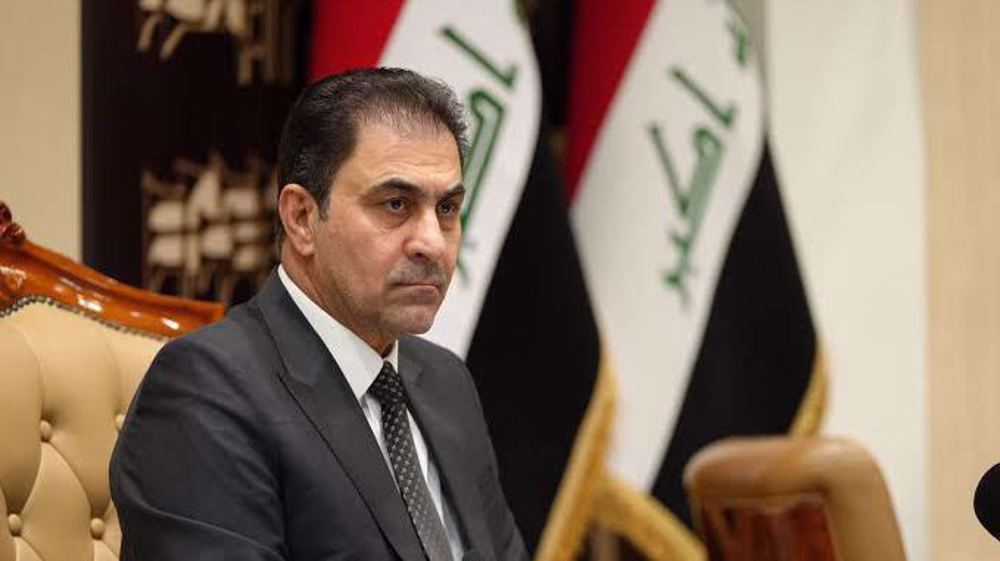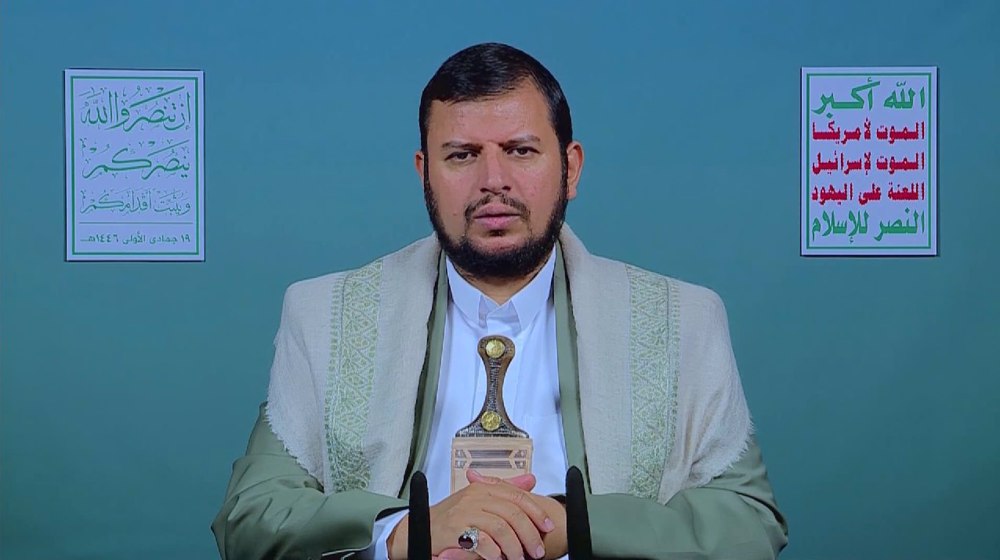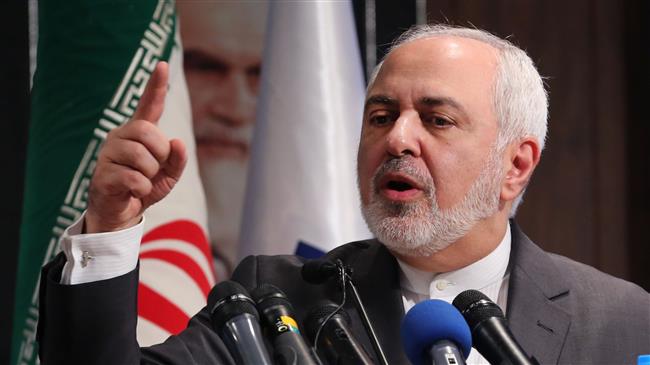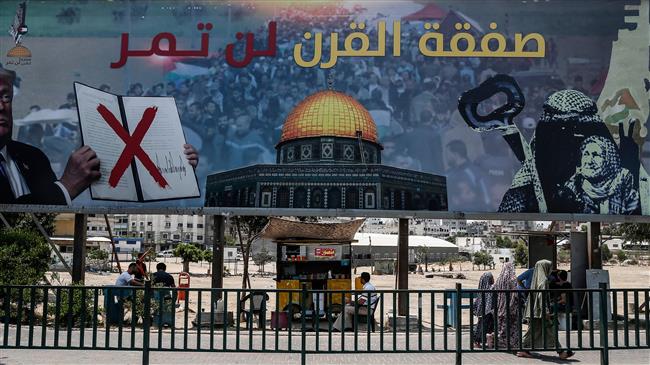Trump’s pro-Israel Mideast deal sparks shock and ire
After months of running a vast propaganda machine to drum up support for his self-proclaimed 'Deal of the Century,' US President Donald Trump has finally unveiled what he believes can serve as a final antidote to the bitter and brutal Israeli-Palestinian conflict that has dragged on for seven decades.
Within just hours since its launch, Trump’s proposed deal has aroused a storm of indignation and opposition among Middle East people and politicians as well as international organizations, earning descriptions such as 'the treason of the century, nightmare, conspiracy, catastrophe, new Balfour Declaration, an annexation plan, a stillborn agreement, a handbook for more suffering, and a deal for the garbage can of history' among others.
Contrary to Trump’s claim who sought to sell his proposal as a win-win opportunity for both sides, political leaders and activists view it as being hugely skewed in favor of Israel and totally ignoring the rights and demands of up to 15 million Palestinians around the world, leaving them out of a process that is expected to decide their fate and their future.
Opponents argue that the highly pro-Israel scheme offers no prescription for peace because it blatantly violates international law and strips Palestinians of their basic rights on a number of sensitive issues, including the state of Jerusalem al-Quds, the future borders of a sovereign Palestinian state, the return of Palestinian refugees driven from their homeland, security responsibility, as well as Israeli settlements built on occupied land.
Trump released his proposed deal during an event at the White House alongside Prime Minister Benjamin Netanyahu in Washington on Tuesday.
The so-called 'Vision for Peace' — which all Palestinian groups have unanimously rejected — would, among other contentious terms, enshrine Jerusalem al-Quds as “Israel’s undivided capital” and allow the regime to annex settlements in the occupied West Bank and the Jordan Valley.
Iran’s Leader: Trump’s satanic deal won’t materialize
The Twitter account of the Leader of the Islamic Revolution Ayatollah Seyyed Ali Khamenei posted his remarks made in July 2018 in connection with Trump’s scheme.
Speaking at that time, Ayatollah Khamenei said “the satanic and malicious policies of the US towards Palestine, dubbed the deal of the century, will never materialize, with God’s grace.”
The American statesmen say Jerusalem al-Quds should be in the hands of the Jews, but it is “a load of nonsense,” the Leader stated.
“The issue of Palestine will not be forgotten,” he said. “The Palestinian nation and all Muslim nations will definitely stand up against them and prevent the materialization of the deal of the century.”
Amnesty: Unlawful deal exacerbates Israeli violations
Amnesty International has criticized the American proposal as “a handbook for more suffering and abuses” in the occupied territories, urging the global community to reject the measures set out in the deal in contravention of international law.
“While the Trump administration has emphasized the principle of land swaps in its deal, we should make no mistake that it is proposing further annexation of Palestinian territory, which would flagrantly violate international humanitarian law. During more than half a century of occupation Israel has imposed a system of institutionalized discrimination against Palestinians under its rule, denying them basic rights and access to effective remedies for violations. The deal amounts to endorsement of these brutal, unlawful policies,” said Philip Luther, Amnesty International’s Middle East and North Africa Research and Advocacy Director.
He also slammed the deal for putting forward a “compensation mechanism” for Palestinian refugees, instead of granting them their right to return to their homeland.
“Hundreds of thousands of Palestinian refugees are trapped in overcrowded camps, more than 70 years after they, their parents or grandparents were first forced out of their homes. This proposal ignores refugees’ rights under international law and the decades of suffering they have endured,” Luther said.
The US scheme, he added, seeks to undermine international justice after the International Criminal Court (ICC)’s decision last month to launch a full investigation into war crimes in the Palestinian territories.
“A just and sustainable peace requires a plan that prioritizes the human rights of Palestinians and Israelis, and must include justice and reparation for victims of war crimes and other grave violations. This plan not only fails this fundamental test; it seeks to torpedo efforts towards justice for both Palestinians and Israelis that are currently under way.”
Turkey: Mideast deal absolutely unacceptable
Turkish President Recep Tayyip Erdogan has lambasted the US-proposed deal as “absolutely unacceptable.”
“Jerusalem [al-Quds] is sacred for Muslims. The plan to give Jerusalem to Israel is absolutely unacceptable. This plan ignores Palestinians’ rights and is aimed at legitimizing Israel's occupation,” CNN Turk quoted him as saying.
Earlier, the Turkish Foreign Ministry said the American proposal was “stillborn,” and that the people and land of Palestine were not for sale.
“This is an annexation plan aiming at usurping Palestinian lands and killing the two-state solution,” the ministry said in a statement.
The ministry noted that Jerusalem al-Quds is a red line in the eyes of Turkey, and that the country would not let Israel justify its occupation and persecution.
“We will always stand by the brotherly people of Palestine. We will continue to work for an independent Palestine within Palestinian lands,” it said, adding that Ankara would not support any plan that is not accepted by the Palestinian authorities and that peace will not materialize in the Middle East without an end to occupation.
Qatar: No peace sans Palestine on 1967 lines
The Qatari Foreign Ministry also emphasized that peace cannot be achieved without safeguarding the Palestinians’ rights by enabling them to establish their own sovereign state on the 1967 boundaries.
The ministry said Doha appreciated what it called American efforts to find solutions to the conflict as long as they are within the framework of international legitimacy.
Israel occupied the West Bank and East Jerusalem al-Quds during the Six-Day War in 1967. It later annexed the city in a move not recognized by the international community.
Palestinian officials say they want the resolution of the conflict with Israel based on the so-called two-state solution along the 1967 boundaries with East Jerusalem al-Quds as their capital.
Jordan supports independent Palestine on 1967 lines
Jordanian Foreign Minister Ayman Safadi affirmed his country’s support for an independent Palestinian state based on the 1967 boundaries with East Jerusalem al-Quds as its capital.
He also warned against “annexation of Palestinian lands” and the “dangerous consequences of unilateral Israeli measures that aim to impose new realities on the ground.”
Safadi further called for direct negotiations to find a comprehensive solution in accordance with established terms of reference, the Arab peace initiative and international law.
“Jordan supports every genuine effort aimed at achieving just and comprehensive peace that people will accept,” he said.
UN backs two-state bid
UN Secretary General Antonio Guterres said the world body supports two states living in peace and security within recognized borders, on the basis of the pre-1967 borders.
"The United Nations remains committed to supporting Palestinians and Israelis to resolve the conflict on the basis of United Nations resolutions, international law and bilateral agreements and realizing the vision of two States - Israel and Palestine - living side by side in peace and security within recognized borders, on the basis of the pre-1967 lines," Guterres' spokesperson Stephane Dujarric quoted the UN chief as saying.

Iraq’s Ayatollah Sistani: US deal hurt Muslim feelings
In a statement released on Wednesday, the office of Iraq’s most prominent Shia cleric Grand Ayatollah Ali al-Sistani strongly condemned the US-devised deal, saying it severely hurt the feelings of hundreds of millions of Arabs and Muslims worldwide.
Influential Iraqi Shia cleric Muqtada al-Sadr also voiced opposition to Trump’s plan and said “Quds belongs to all religions and Palestine to all freedom-seekers.”
Arab League: Deal’s first reading shows waste of Palestinian rights
Arab League Secretary General Ahmed Aboul Gheit said on Wednesday that a first reading of Trump’s proposal indicated a great waste of legitimate rights of Palestinians.
However, he added, the 22-member pan-Arab body was “studying the American vision carefully. We are open to any serious effort made to achieve peace.”
The Arab League will convene an urgent meeting on Saturday on the so-called Middle East peace plan.
Hossam Zaki, the body’s deputy secretary, said Palestinian President Mahmoud Abbas would attend the meeting in Cairo to discuss the issue.
Abbas had earlier asked the body to convene and discuss ways to oppose the US plan.
“The State of Palestine officially asked for an exceptional meeting of the Arab League on the ministerial level, with the attendance of President Mahmoud Abbas…, to talk about ways to confront what is known as ‘the deal of the century,’” Palestinian Ambassador to Egypt Diab al-Louh said.
Saudi Arabia, Egypt, UAE welcome US ‘peace efforts’
Saudi Arabia, Egypt and the United Arab Emirates have welcomed what they called US efforts to establish peace in the Middle East, but underscored the need for dialog between the Israelis and the Palestinians to settle their decades-long dispute.
The Saudi Foreign Ministry said the kingdom supports “all efforts aimed at reaching a just and comprehensive resolution to the Palestinian cause.”
“The kingdom appreciates the efforts of President Trump’s administration to develop a comprehensive peace plan between the Palestinian and the Israeli sides, and encourages the start of direct peace negotiations ... , under the auspices of the United States,” it said in a statement.
The Saudi Foreign Ministry called on both sides to engage in negotiations and “move forward the peace process to reach an agreement that achieves legitimate rights of the Palestinian people.”
The Egyptian Foreign Ministry issued a similar statement, calling on both sides to consider the US proposal.
The ministry appreciated what it called “continuous efforts exerted by the US administration to achieve a comprehensive and just settlement of the Palestinian issue.”
“Egypt recognizes the importance of considering the US administration's initiative from the perspective of the importance of achieving the resolution of the Palestinian issue, thus restoring to the Palestinian people their full legitimate rights through the establishment of a sovereign independent state in the Palestinian occupied territories in accordance with international legitimacy and resolutions,” it added.
It urged both the Israelis and the Palestinians “to undertake a careful and thorough consideration of the US vision to achieve peace and open channels of dialogue, under US auspices, for the resumption of negotiations to present their respective views on reaching an agreement that satisfies the aspirations of both peoples to achieve a comprehensive and just peace and the establishment of an independent Palestinian state.”
UAE Ambassador to the US, Yousef al-Otaiba, said his country appreciated US efforts to draw up a “peace” agreement.
“This plan is a serious initiative that addresses many issues raised over the years,” he pointed out, noting that the scheme “offers an important starting point for a return to negotiations within a US-led international framework.”
EU: Trump plan chance for relaunching talks
The European Union has described Trump’s proposals as a chance for renewed talks towards “a viable solution” for the Israeli-Palestinian conflict.
The initiative “provides an occasion to re-launch the urgently needed efforts towards a negotiated and viable solution to the Israeli-Palestinian conflict," the EU’s foreign policy chief, Josep Borrell, said on behalf of the bloc.
He added that the EU would need to study and assess Trump’s proposals.
However, Borrell cautioned that Israel and the Palestinians needed to show “a genuine commitment to the two-state solution as the only realistic way to end the conflict.”
World leaders, states hail ICC arrest warrants against Netanyahu, Gallant
MP: US accountable for possible Israeli 'foolishness' to attack Iraq
VIDEO | Israeli policies strangle Palestinian agriculture, economy
Iran's president offers condolences to Pakistan over terrorist attack
Canada’s Yukon town council at standstill over refusing oath to King Charles
Yemen's Houthi calls for jihad to protect Palestine against Israel
VIDEO | Internal rifts within Israel
Russia launches 'ICBM' for first time against Ukraine: Kiev

















 This makes it easy to access the Press TV website
This makes it easy to access the Press TV website